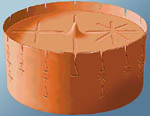Around that time, they discover the compass. Their first instrument was a crude magnetised iron rod fixed on a star-bar-cross symbol.  The star was the north (as for the Polar Star, their other navigational reference) and the cross was the south. Since they sailed along an east-west axis, the head of the bar pointed always to the west and Galicia, their main settlement. This was of a great use since the Cantabrian coast is often hidden by fog.
The star was the north (as for the Polar Star, their other navigational reference) and the cross was the south. Since they sailed along an east-west axis, the head of the bar pointed always to the west and Galicia, their main settlement. This was of a great use since the Cantabrian coast is often hidden by fog.
Years later, some of them sail northward and up the French coast until they reach Brittany. There, they meet other Celts and settle in the bay of what is now Brest. They have now lost contact with Galicia, being too far away. Many of them work as pilots on other vessels passing through the Ras de Sein and Chennal du Four. They keep the belief that their original country was in the west, as the compass pointed out. They also had the oral tradition that, once in the past, they had their own land and their own king. From the mixing of Christianity, they came to believe that they had been living in the Paradise, the spices islands, the land of plenty.